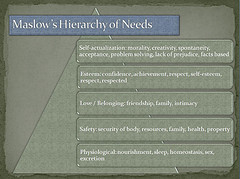Why Does Psychotherapy Work? Manage Anxiety
Clearly, psychotherapy doesn't work for everyone. Some more than others. The bigger question, the real question, is why it works at all. Psychotherapy isn't just communication. We all communicate all the time and it doesn't change much. How many conversations have you had in a lifetime that you thought, 'wow I feel so much better now'?
The answer (of course there isn't just one) is long, complex, involved. I can recommend a good college or two. The cliffnotes, personal version around here takes into account what I was talking about the last week:
Maslow's hierarchy of needs

Psychotherapy works because it takes our screaming, wandering anxious minds which are generally over-occupied with fear, demanding we ever take extra care lest we fall off a cliff, and makes them work on a totally different level. It says, wait, hang on, look around, what you need to manage anxiety isn't down there at the bottom of the list. You already have that, more or less. What you need's up here, where heart and mind and head meet. Where these really big questions are, where something's still missing and your whole existence is so wrapped up in that even your adrenal system knows it.
Therapy forces you to take time and focus away from the feeling of imminent threat, and re-purpose it towards the things that help engage the rest of your self. The neglected needs and parts that, given a little room to maneuver, can counter-balance anxiety.
Psychotherapy: Expand your idea of need
Developing this kind of awareness through psychotherapy is like building a home from the ground on up.

Laborious, but worthwhile. Eventually it's a place to take refuge, shelter, grow into.
The first steps are rocky, you have little real idea what you're getting into, let alone how you're going to do it. The therapist is like some hippie, part-time contractor you work with if only because the simple investment of your story thus far disinclines you to shop around, unless forced to. You assume said therapist has some idea what they're doing, and hopefully that's true but still, you're the one paying for this, getting the supplies in, hammering things together. Things that may or may not resemble doors, a roof, the foundation. It's always a matter of need.
You need shelter from anxiety as much as you need to treat it. And your hippie, part-time contractor can provide that much, at least.
APA Reference
White, K.
(2011, August 28). Why Does Psychotherapy Work? Manage Anxiety, HealthyPlace. Retrieved
on 2026, March 3 from https://www.healthyplace.com/blogs/treatinganxiety/2011/08/why-does-psychotherapy-work-manage-anxiety
Author: Kate White
It really helps when your psychotherapist has a good knowledge and understanding of the various psychotherapies. The old addage "if all you have is a hammer, everything looks like a nail" makes sense here. A good therapist needs to have an understanding, appreciation for, and ability to apply many therapeutic interventions based on many therapies. I have found that compassionate collaboration is key to hammering out the patient counselor contract.
I would say likewise with Lady Delphinium. He can really help with his counselling sessions. But I also acknowledge that we have different experiences and views on the matter. And I agree with you, we are the ones that do the hammering.
I got really really lucky with my therapist. My doctor sent me to him and he is wonderful! I wish I had known him years ago, for he is really helping me.
Great to hear that, Lady Delphinium. It can be such a potluck out there.